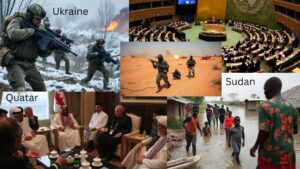The 2024 Democratic National Convention kicked off with enthusiasm as party delegates gathered to endorse a manifesto and unite behind Vice President Kamala Harris. Our coverage dives into the key moments and discussions that set the stage for the upcoming presidential election.
The Journey to Nomination
The Journey to Nomination: The road to the 2024 Democratic National Convention was marked by an unprecedented procedural evolution, primarily highlighted by the landmark endorsement of Kamala Harris by President Joe Biden. This strategic move not only underscored the unity within the party but also set the stage for a historic nomination process. The culmination of intense primary races was further distinguished by the introduction of online voting, a testament to the party’s commitment to accessibility and modernization. Kamala Harris’s nomination represented a pivotal moment, not just for its historic nature but for the inclusivity it signified within the Democratic Party. Her background, as a woman of color with significant experience in both the executive and legislative branches, showcased the diversity and depth of representation the party aimed to project. Furthermore, Harris’s regional representation, having served as a Senator from California, underscored the strategic importance of engaging voters from across the nation, particularly from key battleground states. The selection process’s evolution, marked by both the endorsement and the digital voting mechanism, illustrated a forward-looking approach, setting a new precedent in the political arena. This significant milestone not only highlighted the Democratic Party’s adaptability and inclusiveness but also solidified its position going into the 2024 presidential election, with a clear message of unity and progress.
Crafting the Democratic Platform
Following the historic nomination of Kamala Harris, Day One of the Democratic National Convention shifted focus toward unifying the party’s vision and values into a cohesive platform. The development of the Democratic Party platform was a testament to an inclusive process that drew from the diverse voices of pledged delegates across every region and demographic. These discussions were not merely procedural; they were a vibrant tapestry of American concerns, aspirations, and ideals.
Major themes that emerged were climate change, healthcare reform, economic inequality, and social justice—issues that resonate across the national landscape but take on unique characteristics in different communities. The delegates were cognizant of these nuances, ensuring the platform was both a reflection of national priorities and a nod to local concerns. This approach mirrored the overarching strategy of the party: to present a unified front that genuinely addresses the multifaceted challenges facing Americans.
The strategies and plans set forth by the party were ambitious yet pragmatic, aiming for sweeping reforms that could realistically be achieved. Central to the platform was a commitment to bolstering the middle class, providing affordable healthcare for all, tackling climate change head-on with innovative policies, and ensuring justice and equality permeate every aspect of governance. These core issues were interlaced with the Democratic values of inclusivity, empathy, and cooperation.
By weaving these commitments into the fabric of their platform, the Democratic Party aimed not only to address the immediate concerns of today but also to lay a strong foundation for a prosperous, equitable future. This vision for America’s future, reflective of Harris’s own narrative and diversity, represented a beacon of hope for supporters and a clear delineation of the party’s values as they embarked on the road to the White House. The platform set on Day One of the convention was a bold proclamation of where the Democratic Party stands and where it intends to lead the country, crafted carefully to resonate across states, demographics, and ideologies.
The Role of the Host City
Chicago, chosen for its rich political history and strategic importance, emerged as the host city for the 2024 Democratic National Convention. It’s a city steeped in political conventions, having hosted numerous significant events that shaped the landscape of American politics. This historical significance played a crucial role in its selection, underpinning a deep narrative of progress and resilience that aligns with democratic values. The logistical prowess of Chicago, combined with concerted efforts by local leaders, showcased the city’s capability to host such a monumental event. They emphasized Chicago’s ample infrastructure, security capabilities, and accommodation facilities, ensuring that the delegates and attendees would have a seamless experience.
At the heart of the event, the United Center stood as a testament to these logistical feats. It was not just a venue but a symbol of unity and strength, chosen for its iconic status and vast space capable of accommodating the large number of delegates and attendees. The significance of this location goes beyond the physical, representing a bridge between the city’s storied past and its future aspirations.
The economic and cultural impact on Chicago was anticipated to be substantial. The convention was expected to inject millions into the local economy through hotel stays, dining, and tourism. Beyond the economic boon, it presented an opportunity for Chicago to be showcased on the national stage, highlighting its cultural richness, diversity, and spirit of innovation. This event promised to leave a lasting legacy, strengthening Chicago’s position as a key player in national politics and reinforcing its cultural and economic vitality. As the city prepared to welcome the Democratic Party, the atmosphere was charged with anticipation, ready to add another historic chapter to its rich political tapestry, seamlessly connecting to the broader objectives of unity and progress discussed in the preceding and following chapters.
Unifying for the General Election
Following the vibrant introduction to Chicago’s pivotal role in hosting the 2024 Democratic National Convention, Day One shifts focus towards the unifying efforts central to propelling the Vice President and her running mate towards the general election. The air inside the United Center buzzed with anticipation, as delegates and attendees from varying factions within the Democratic Party gathered, emblematic of the party’s diverse ideological spectrum. To address the inherent challenges of melding such diversity into a cohesive force, the day was meticulously planned with speeches that not only celebrated the party’s core values but also spotlighted the strategic importance of unity in facing the upcoming electoral battle.
High-profile figures took to the stage, delivering stirring orations designed to bridge divides—highlighting progressive strides while acknowledging the pragmatic steps necessary for broader electoral success. These speeches served as a clarion call for solidarity, emphasizing the critical stakes of the upcoming election.
Beyond rhetoric, the convention showcased strategic discussions on mobilizing support across the party’s broad base. Breakout sessions were dedicated to crafting inclusive messages that resonate with both progressive stalwarts and moderate voices, ensuring that policy proposals did not alienate any segment of the party’s base.
In a visually symbolic gesture of unity, the stage was adorned with imagery that represented the wide tapestry of the Democratic electorate, including references to landmark achievements and future aspirations that spoke to all corners of the party. These visuals underscored the theme of cohesion and collective effort.
Day One of the convention was not just about speeches and imagery; it was a strategic embodiment of the Democratic Party’s commitment to inclusivity and victory. It laid down a foundational ethos of solidarity, recognizing that despite the varying perspectives within its ranks, the path to the White House necessitates a united front, ready to engage with the complexities of the general election. This day set a tone of determination, aiming to transform the party’s diverse strengths into a singular, formidable force.
Conclusions
As day one of the 2024 Democratic National Convention concludes, the party has laid a robust foundation for the election season. Delegates have fostered unity, endorsed Vice President Harris, embraced a progressive platform, and set forth a prime opportunity to rally Americans towards a common future.













